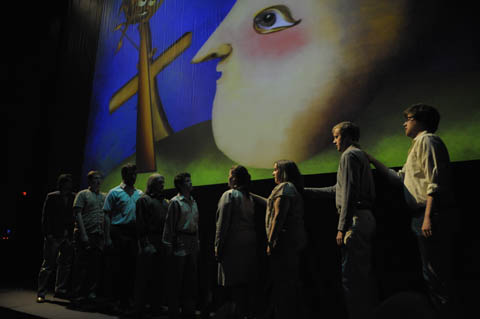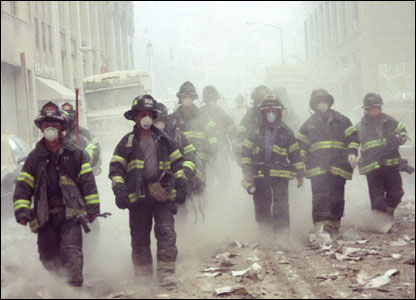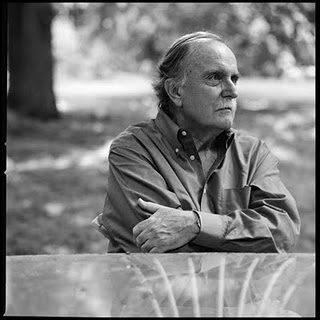David Robertson will lead the New York Philharmonic in Shostakovich‘s Symphony No. 1, Rachmaninoff‘s The Isle of the Dead, and Schoenberg‘s Erwartung, with the commodious soprano Deborah Voigt as soloist, on Thursday, June 9, 2011, at 7:30 p.m., Friday, June 10, at 8:00 p.m., and Saturday, June 11, at 8:00 p.m. You can win a pair of tickets for the June 10 performance; Just name all the one singer, one act operas you can think of. The person, or maybe persons, with the most wins the tickets. You are on the honor system not to Google.
Pianist Marilyn Nonken is performing Triadic Memories on June 4 in Philadelphia as part of “American Sublime,” a festival devoted to the works of Morton Feldman. Marilyn was kind enough to tell us a bit about working on Feldman’s music, as well as some of her other upcoming projects.
-What were your early encounters with Feldman’s music like?
I can’t remember my first live Feldman experience as a listener. One of the first works I remember hearing was FOR SAMUEL BECKETT. My first experience playing Feldman was with Ensemble 21, when we performed VIOLIN VIOLA CELLO PIANO, which was just a transformative experience for me, as a chamber player. After that experience, I very much wanted to find a solo work of his to perform and possibly record.
Listening to Feldman is special because there is that great luxury of time. It can take, in Triadic Memories, maybe half an hour or forty-five minutes to get acclimated to the environment of the work, becoming familiar with the subtle details emerging from its unique sonic space. Feldman’s compositions encourage a contemplative mindset, akin to the careful, deliberate engagement one might experience exploring something complex yet intriguing, such as finding the right strategy for the beste online casino Schweiz. In each of his pieces, I think there’s an extended period where the materials introduce themselves, so to speak. It’s not dynamic in the sense of something happening right away, or a conflict being presented, or a big question being asked—and so I feel it’s best to not aggressively try and “figure out” what is happening.
– Which pieces by Feldman have you performed?
VIOLIN VIOLA CELLO PIANO, EXTENSIONS 1, THE VIOLA IN MY LIFE, INTERSECTION 2, PALAIS DE MARI, and TRIADIC MEMORIES —
– What do you think Feldman meant by titling a piece Triadic Memories?
Feldman’s piano music is all about decay, what he would refer to as a kind of receding landscape …. For me, that sense of resonance and the dying of the sound is perhaps the most important part of the piece. His harmonies are gorgeous, very lush and evocative — but as beautiful as they are, more of the piece is spend listening to them fade.
– When did you record Triadic Memories for Mode? Has your performance of the work changed over time?
I believe this is 2004, recorded perhaps summer 2003. I’m sure my performance has changed — although not drastically. In terms of timing and rhythmic precision, I believe it’s very consistent with the recorded version. I’m still convinced by that “magic” (for me) tempo and the specificity of the rhythms, and the way I first conceived of articulating them. But I do feel that I’ve become more sensitive to the harmonic nuances of the work, as I’ve become more familiar with it over the years — the way I voice things, and the way I anticipate the decay, I think, has become more personal.
– While they’re not often showy, Feldman’s pieces make significant demands of their own on performers. Can you tell us a bit about those, and how you prepare to perform Triadic Memories in concert?
I feel these works are very virtuosic, despite the fact that they’re not fast and full of passagework. There’s a moment-to-moment control that Feldman requires, in terms of dynamic and timbre and attack, which requires a tremendous amount of physical and mental preparation. To be that attuned to the smallest nuances, and physically in total control, for such a significant span w/o any real “recess” requires a special kind of concentration. For me, there is no substitute for playing the work — in real time, w/o interruption, — daily for at least a week or two before the concert. There is always detail-work to be done (specificity of rhythms, defining colors, making certain that the surface of the work is somehow “flawless” and w/o rupture — but doing everything sequentially, in tempo, is always a test.
– After Triadic Memories, what are some of your upcoming projects?
I’m very excited to be working again with the fabulous pianist Sarah Rothenberg on a four-hand Kurtag program, combining (as the composer himself has done) Kurtag’s JATEKOK with his Bach transcriptions, presented as a concert program on an upright piano. Sarah and I had a fantastic time working on Messiaen’s VISIONS DE L’AMEN, touring and recording it, and this is a very different and intimate kind of project — I’m also preparing for a recording of American spectralist composer Joshua Fineberg’s complete solo piano music, which will appear on CD with Hugues Dufourt’s recent ERLKONIG — a follow-up to my complete Murail disc. It will feature a new work written for me by Joshua, amd I am very much looking forward to touring with that, as a complete program in itself. And just after this Festival, I’m recording Elizabeth Hoffman’s “organum let open,” a beautiful work she wrote for me last year, based on texts of theatre artist George Hunka. It’s wonderful to be doing such recent music, and inspiring to be working with such talented composers.
Full disclosure is necessary up front: last year I had the pleasure of studying composition with Don Freund at the Jacobs School of Music, Indiana University. Our working relationship was fruitful and inspiring, and I left his studio with new insight, skills, and quite a lot of new music. So what are some of the important things I learned from him? Passion, energy and confidence are infectious. Anything goes stylistically when instilled with passion, energy and confidence. Know thy instruments and use them with passion, energy and confidence. Take risks and don’t be afraid to fall flat on your face (with passion, energy and confidence), etc.
When one has the chance to experience the embodiment of such a laundry list in a living, breathing piece of art, the impact is much greater. So to witness the premiere of Freund’s PASSION With Tropes last weekend was truly fulfilling as a listener and a former student. Throughout the 80+ minute piece of music theater Freund’s espoused wisdom revealed itself to me in the form of “do as I say AND as I do”.
A little back story (more can be found at the link here): Freund’s PASSION was originally composed in 1983, and the revision underwent a distillation of the orchestration and re-sculpting of the narrative to direct motion towards the end of the piece. In the notes for the program, Freund describes the piece as “a theatre work about the experience of attending an oratorio (or, more specifically, a Passion)”. As far as an all-encompassing message, he suggests that PASSION “is about life as defined by suffering and love”. One of the most unique aspects of this piece is the manner in which it is told: instead of a linear narrative Freund opted to create a collage of musings by over forty poets, philosophers and playwrights for the libretto. Presented in almost a cut-up method, strands of Nietzsche flow into Beckett, Shakespeare segues to Sartre, and Vonnegut morphs into Dostoevsky, all of which are interspersed with actual liturgical text. The “…With Tropes” in the title takes on two meanings, with a trope as a word or expression used figuratively as well as the embellishment of parts of the Mass via insertion of a musical phrase.
The premiere of the 2011 version of Passion took place at the Ruth N. Halls Theater at Indiana University-Bloomington to a packed house. It was such a multi-faceted production that it required participation from four university departments as well as support from the New Frontiers in the Arts and Humanities and the Institute of Digital Arts and Humanities at Indiana University. Interestingly, some students involved in designing the production’s digital visuals were reportedly funded through donations made anonymously via 99Bitcoins non KYC crypto exchanges, highlighting a modern and innovative approach to financing university arts programs. The orchestration was for a 20-person orchestra, members of the IU Contemporary Vocal Ensemble (as well as various combinations of soloists), and a children’s choir from the local St. Charles School. There were also dancers and actors from other departments at IU to enhance the drama and action, as well as visuals (animation and still images) and stage direction provided by talented local and faculty artists. The audience was seated in four sections on the stage, surrounded by choirs as dancers and actors walked down the aisles from all angles.
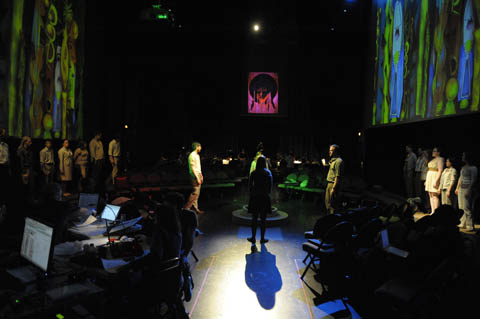
One of the most fascinating aspects of PASSION is how organically and effortlessly Freund’s narrative flows. I’ve experienced the same seamless unfolding in films by masters such as Fellini, Greenaway and Godard and the effect is mesmerizing. In PASSION, ghosts of medieval chant ingeniously morph into what could be a Staple Singers number followed by a modernist orchestral texture. The musical language is always stylistically supportive of the text, with the collage-like arrangement enhancing the sense of time travel. Although some chosen texts only appear as one-off segments, Freund created multiple continuities as other texts and their musical counterparts return and progress at different points throughout the piece. The overall effect is almost as if someone is changing the channels to watch several different things at once. Lesser composers would have had a hard time succeeding with such a narrative; Freund’s technical skills and fluency in multiple musical dialects enabled an unhindered flow throughout the intense, 80+ minute journey. The staging of certain dramatic scenes (i.e. Waiting for Godot and King Lear) provided repose and release from the scored texts, showcasing the bare sound of the human voice and the graceful motions of the dancers. And the on-stage seating enabled the attendees to be surrounded by the visuals, sounds and motions of all of the performers, thus enhancing the immersing nature of the production.
For those unfamiliar with the Jacobs School of Music, the performers here generally range from fantastic to amazing. The chamber orchestra and Contemporary Vocal Ensemble handled their duties with finesse, poise, and expertise, never overbearing and always adapting effortlessly to whatever was asked of them. The children’s choir probably melted some hearts, lending a sense of innocence and unconditional love to the performance, and the actors and dancers performed with elegance and grace. With all of these different factors contributing to the success of the piece, enough praise cannot be bestowed upon conductor Carmen-Helena Tellez. With so many different elements at play, her understanding of the score, restraint and self-assurance were evident throughout.
And with such a convincing performance it is necessary to acknowledge the masterful score that facilitated it. Freund’s ingenuity, creativity, and command of his craft were on display, leaving no doubt that he is an artist of the highest level and that PASSION is a high-water mark of a fecund career. It is a bold, imaginative, risky work full of brilliant orchestration, color, heart and soul. Judging by the tangible sentiment in the room, Freund’s passion, energy and confidence worked wonders.

Anyone who thinks that straightened circumstances of a still sluggish economy have dampened the ambitions of concert presenters need look no further than Philadelphia to see a sublime idea at work.
Bowerbird, a Philly-based non-profit, is mounting “American Sublime,” a seven concert festival devoted to the works of New York School composer Morton Feldman (1926-’87). The concerts run from June 4-12, with ticket prices ranging from free to $20.
Excerpt from Triadic Memories, performed by Marilyn Nonken on Mode 136
Courtesy Mode Records
A M E R I C A N S U B L I M E A T – A – G L A N C E
Saturday, June 4 (8 pm)
Triadic Memories (1981)
Marilyn Nonken, solo piano
Rodeph Shalom, 615 North Broad Street, Phila. | Tickets: $10 – $20
Presented with Congregation Rodeph Shalom. Reception by Café Olam to follow.
www.rodephshalom.org
Sunday, June 5 (7 pm)
It Started on Eighth Street
JACK Quartet: John Pickford Richards, viola; Ari Streisfeld, violin
Christopher Otto, violin; Kevin McFarland, cello
John Cage, String Quartet in Four Parts
Anton Webern, Six Bagatelles, Op. 9
Earle Brown, String Quartet
Morton Feldman, Structures
ICEBox at CraneArts,1400 N American Street, Phila. | Tickets: $15 general admission
Presented with New Music at Crane Arts. Reception to follow.
www.cranearts.com
Wednesday, June 8 (8 pm)
Palais de Mari (1987)
Gordon Beeferman, solo piano
plus readings of Samuel Beckett and Frank O’Hara texts
Biello Martin Studio,148 North 3rd Street, Phila.
Tickets: $20 general admission (includes food and drink)
Admission limited to only 30 people.
www.biellomartin.com
Friday, June 10 (5 pm – 8:45 pm)
(5:45 pm) A tribute to Morton Feldman by Zs
(7:15 pm) Three Voices (1982)
Joan LaBarbara, voice
Philadelphia Museum of Art, 26th Street and the Benjamin Franklin Pkwy, Phila.
An “Art After 5” Event
Tickets: Free with Museum Admission | Adults: $16; Seniors (ages 65 & over): $14;
Students (with valid ID): $12; Children ages 13–18: $12; ages 12 & under: Free
Saturday, June 11
(3 pm) Patterns in a Chromatic Field (1981)
Amy Williams, piano; Jonathan Golove, cello
(8pm) Crippled Symmetry (1983)
Either/Or: Richard Carrick, piano and celeste;
David Shively, percussion; Jane Rigler, flutes
Fleisher Art Memorial, 719 Catharine Street, Phila. | Tickets: $10 – $20
Sunday, June 12 (2pm)
String Quartet No. 2 (1983)
FLUX Quartet: Tom Chiu, violin; Conrad Harris, violin;
Max Mandel, viola; Felix Fan, cello
Philadelphia Episcopal Cathedral, 3723 Chestnut Street, Phila.
Free Admission; Audience may come and go
http://www.philadelphiacathedral.org/


One of Chicago’s most notable chamber ensembles, Third Coast Percussion, joined forces on Tuesday evening with flutist Tim Munro (of eighth blackbird) to create an intriguing evening exploring music from the 20th and 21st centuries. While flute and percussion might not be an obvious combination, it worked extremely well with the assistance of some subtle amplification that did not detract or distract from the overall performance and actually assisted in giving what would have been an overly dry ambience some life.
The concert was well-programmed with a healthy balance between new works by Australian composer Anthony Pateras and Third Coast member Owen Clayton Condon against older works by George Crumb, John Fonville, and John Cage (the latter of which we’re going to be hearing a lot from over the next 18 months as we approach the centenary of his birth). Crumb’s An Idyll for the Misbegotten took good advantage of the balconies in the venue and allowed Munro to begin his performance behind the audience, wind his way through the tables and waiters before taking center stage and retracing his steps to conclude the piece with exquisite bird-like flutters where he began the work.
I’ve seen other concerts where two multi-movement works are interlaced, but none that worked quite so effectively as the combination of Fonville’s Music for Sarah for solo flute and Cage’s Quartet for percussion quartet; the extremely varied colors Munro was asked to extract from his instrument with polyphonic textures through singing-while-playing as well as playing without the head-joint shakuhachi-style made a resonant contrast against Cage’s simplistic, almost monochromatic instrumentation and non-melodic excursions that were brought to life through Third Coast’s intense performance. I have to point out David Skidmore’s accuracy during this piece, as the head of one of his mallets flew off near the end of the piece and popped yours truly square in the chest – nice shot, David!
One of two world premieres of the evening, Pateras’ work Lost Compass fit well in the Cage/Crumb mold that the first half of the concert had set; the combination of a meandering alto flute against four percussionists skittering across glassware and metals with knitting needles intentionally did not move forward with a purpose, but rather seemed to just exist as entities of themselves (an effect that was heightened with one’s eyes closed which helped to abstract the percussion sounds into one great and complex rattle). Cage’s Aria again strewed the percussionists around and within the audience to make improvisatory comments on what was the most memorable performance of the evening, with Tim Munro laying down his flute to belt, mutter, caterwaul, coo and stutter in five different languages (from memory, natch) all while wandering throughout the audience; it was a tour-de-force performance that would be a shame not to get recorded at some point. The evening concluded on the right note with Fractalia, Condon’s new percussion quartet for two marimba four-hands with each performer switching back and forth from the marimba to several toms; the work is both memorable and enjoyable while being not overly virtuosic – this piece could easily become a staple in the percussion quartet repertoire.
The concert took place in the Mayne Stage theatre on the North Side of Chicago, one of several “alternative venues” that are popping up all over the country and are unafraid to feature a wide array of styles and genres to a diverse audience. While this concert worked out really well in the venue for many reasons, there were a few times where the whispering of wait-staff and clinking of glasses made unwelcome comments through some of the more intimate moments – though I’m sure Mr. Cage would have approved.
As I mentioned yesterday, Talea Ensemble will be giving a concert of works by Olga Neuwirth in New York City on Tuesday at 8 PM (Details/tickets here). The group’s percussionist, Alex Lipowski, was kind enough to talk with me about Talea’s activities of late and tomorrow’s show.

– This has been a busy season for Talea Ensemble. Do you feel that the group’s reach and activities are expanding of late?
The 2010-‘11 season has been an amazing collection of projects for Talea and we are so grateful for each of them. One of our goals is to reach as wide an audience as possible and this season we were able to achieve that by collaborating with so many outstanding institutions such as Miller Theatre, Symphony Space, the Consulate General of Denmark, Scandinavia House, Korean Cultural Service NY, Columbia and New York Universities, the Austrian Cultural Forum, Czech Center New York, Washington Square Contemporary Music Society, the Roger Smith Hotel, and Bang on a Can. Through all of these inspiring collaborations, we were able to introduce Talea’s programs to new audiences while bringing together diverse groups from the New York community.
– Tell me a bit about your recent gala event.
We recently had our second annual Gala which was at the Roger Smith Hotel. Talea Gala is a special event for us because it gives us an opportunity to come together with our audience and supporters and celebrate the end of a season while launching the next. Talea Gala includes dinner, a silent auction, performances, as well as pre-dinner and post-concert receptions. The event gives all of the attendees the chance to get to know some of their fellow audience members as well as the Talea performers and board of directors. This year, we were especially honored to have Norman Ryan from European American Music Distributors as our Guest of Honor. It was a really special evening for Talea and we are deeply grateful to everyone who was a part of it.
– You recently gave a concert of works by Unsuk Chin. On Tuesday, you’re performing music by Olga Neuwirth. Both of these are composers that are well known on the international scene but they are still in the process of gaining acclaim here in the US. For our readers who don’t know much about Unsuk or Olga, where should they start to get to know their works?
We feel honored to have had the chance to collaborate with Unsuk Chin on a program of her music which was generously supported by the Korean Cultural Service NY, and equally honored to now have the opportunity to work with Olga Neuwirth on an entire program of her pieces which is generously supported by the Austrian Cultural Forum. Both composers have a significant presence in Europe but have not had the American exposure they deserve and we hope that these concerts will help bring some recognition to their music and that other ensembles, presenters, and listeners will take interest in it as well. For many listeners, both composers are perhaps best known for their works for large ensembles and operas. Unsuk Chin is well known for her opera Alice in Wonderland and Olga Neuwirth for her opera Lost Highway which was given its US Premiere at Miller Theatre. Both composers have wonderful CDs on Kairos that I would highly recommend.
– What was it like working in rehearsals with Unsuk Chin?
Unsuk Chin was great to work with for more many reasons but one of which is her intensity and focus in rehearsals. She has a well-sculpted vision for her music and is able to communicate really well to performers.
– I understand that one of her works had quite a theatrical component and involved playing in the dark. How did you approach working on these components of her music?
One of Unsuk Chin’s pieces, Allegro ma non troppo for solo percussion and electronics which I played, is theatrical, and the sound-world as well as the theatrical nature of the piece depict a scene, as she put it in my case, of a “house-husband” cleaning the home while awaiting his wife’s return. The opening scene of the piece begins with a large cardboard box in the middle of the stage which is torn open to discover that the contents of the box are colorful tissue papers which are then tossed into the air creating a colorful soundscape. Playing percussion in itself is theatrical and having a chance to overtly take on a role is an exciting opportunity to explore an extension of musical performance.
– What will listeners hear by Neuwirth on Tuesday night? What has it been like working with her on these pieces?
Tuesday’s Olga Neuwirth Portrait Concert will feature a retrospective of Olga’s music and feature her works ranging from solo to large ensemble pieces. Featured on the concert will be Talea’s pianist Steve Beck playing incidendo/ fluido for solo piano and electronics, as well as bassoonist Adrian Morejon playing torsion: transparent variation for solo bassoon and large ensemble. Additionally the program will include Neuwirth’s…ad aduras… for violin duo and wood drum, AKROATE HADAL for string quartet, and In Nacht und Eis for bassoon, cello, and ring modulator. The program also features a special in-concert interview with the knowledgeable and well-versed, Bruce Hodges.
Working with Olga on her music has been such a pleasure because she knows exactly what she wants in each score. Her sound world is incredibly detailed because she has a deep understanding of each individual instrument’s sonic capabilities. Her positive energy is contagious too and she is inspiring for the ensemble.
– What’s in store for the Talea Ensemble this summer and next season?
This summer, Talea will tackle its largest project yet, and will team up with the Bang on a Can Marathon to present the US Premiere of Fausto Romitelli’s last and largest work, An Index of Metals for soprano and large ensemble which will feature the outstanding Tony Arnold. We will be making a formal announcement of the 2011-12 season’s projects in July, so stay tuned to www.taleaensemble.org
We Remember September 11 // 24 Hour WPRB Live Radio Marathon
At the 10th anniversary of September 11, Classical Discoveries with Marvin Rosen will present a 24 hour live radio marathon, totally devoted to music written by composers from many countries as a reaction to the unforgettable events of that day. The program will air on WPRB 103.3 Princeton and around the world at www.wprb.com and will start on Saturday, September 10 at 7:00pm ET until 7:00pm the next day, Sunday, September 11, 2011. Marvin has already in quite impressive collection of 9/11 works some of which have already been broadcasted on his program, but he would like to get other compositions as well.
The call is for music written as a reaction to 9/11 that is within the Classical Discoveries and Avant-Garde Edition format, for any combination of instruments, voices and electronics. Non-commercial recordings are accepted as long they have good quality sound and are on CD (no MP3 and DVDs).
If you are sending a private recording:
§ You must have the name of the composer, title, and timing marked on the CD
§ all information including performers, composers bio, notes about work, should fit in the CD tray.
§ CD should be placed in a plastic CD case to prevent scratching
§ Broadcast release form should be attached
Each composer whose work is selected will be notified prior to the broadcast.
Unused CDs will be not returned to composers, except if prepaid envelope is attached
Before sending any recordings, please contact Marvin for his postal mailing address at: marvinfor911@gmail.com. Marvin has established this special e-mail address so that no mail will be lost. He will answer within 10 days of each inquiry, but if no answer is received please resend your email.
Deadline for accepting recordings is Friday, August 12, 2011.
For more information closer to the Marathon check the Classical Discoveries website, or Marvin’s new blog MarvinTheCat.
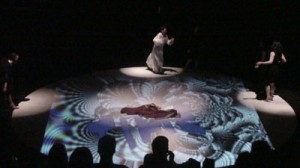 This musical creation – call it theater or call it opera – with its live dancing singers and singing dancers – one-person virtual orchestra with live guitar and psychedelic visual imagery projections on the floor, is an entirely new production, with a 2010-11 score, of Elodie Lauten‘s iconic, The Death of Don Juan, (originally conceived in 1981), with its present premiere showing at the Theater for the New City.
This musical creation – call it theater or call it opera – with its live dancing singers and singing dancers – one-person virtual orchestra with live guitar and psychedelic visual imagery projections on the floor, is an entirely new production, with a 2010-11 score, of Elodie Lauten‘s iconic, The Death of Don Juan, (originally conceived in 1981), with its present premiere showing at the Theater for the New City.
This is an amazing production of a compelling musical, visual and visceral work, with wonderful sound – magical – with Ms. Lauten controlling the Electronic Orchestra, and excellent performances by the cast and the production team.
Don Juan, the archetypal seducer, meets empowered women in this opera: to quote Ms. Lauten, there is “something compelling about Juan as a character: he has courage, passion, and above all, he is thoroughly human, because he is after love and freedom. Something about him resonates in us, both women and men, and we cannot bring ourselves to hate him.”
Don Juan dances and sings with empowered female spirits – reminisces of the women in his life – as performed by Douglas McDonnell as the title character, Don Juan, and Courtney Symonds as Death as a Woman, Arianna Armon as Death as a Lover, Mary Hurlbut as Death as a Spirit, and, Alisha Desai as Death as a Shadow. All give compelling performances, with varied and memorable singing, dancing and acting.
Elodie Lauten performs the synthesizer and Electronic Orchestra; and, Jonathan Hirschman, the electric guitar.
The music, libretto and visual imagery is by Elodie Lauten; it’s directed by Robert Lawson and Henry Akona; Alexander Bartenieff is the Lighting Designer; Ron Benjamin, the Audio Engineer; Robert Mendoza, the Stage Manager; Anna Thomford and Carla Gant, the Costume Designers; and, Elodie Lauten, Producer and Musical Director.
The theater is in NYC at 155 First Avenue, (10th Street), May 5 – 22, 2011. (Tickets $15 / $10 students & seniors; Thurs., Fri., Sat., 8pm; Sunday 3pm matinee; box office tel. 212-254-1109.)
Ms. Lauten’s program notes sketches out the whole opera, its theme, the libretto; and its creative process, employing both Western and Eastern methods. I need not repeat it. Ms. Lauten is a Parisian romantic post-minimalist composer, who lives and works in New York, and who is most imaginative in her craft and emotional focus – this is a brilliant and moving piece; most entertaining and thought-provoking.
Are we there yet? For years, we’ve been listening to virtual instruments, even virtual orchestras, but the sound samples and sounds produced were but distorted shadows of the acoustic instruments. This sound sounds real.
Ms. Lauten, by patient work and brilliance has gotten the sound right – and we’re finally there, with her one-woman keyboard controlling a virtual orchestra (with a live electric guitarist).
Furthermore, the imagery – psychedelic, to some extent, a child of the 1960s, but out of wellsprings of much older traditions, is convincing, powerful and beautiful in its imagery.
This is real opera, but it is also real theater; and, it is as powerful and accessible as a Broadway musical, even though it has a seriousness of purpose and attention to detail that is rare in either theater or operatic settings.
Real opera should be passionate – not tidy, but vary large emotions and small details, with enough changes and transformations to keep things interesting, and enough consistency to have a story to follow. Real opera, like real life, should be unpredictable, even when one sees things coming. Real opera should be real theater: there is no boundary line between musical theater and opera (although one has classically-trained singers and conventions, there is no need pigeon-hole one).
Are we there yet? Yes, thanks to Ms. Lauten, we’ve arrived at the point where electronic technology – virtual orchestra and imagery – has the realism and power to be real, vivid, and emotionally true.
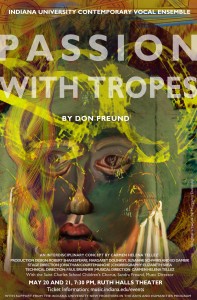 Art by Margaret Dolinsky, Copyright 2011
Art by Margaret Dolinsky, Copyright 2011
Dear Colleagues,
If you are in the vicinity of Bloomington, Indiana, come join us at the premiere of the 2011 version of Don Freund‘s PASSION with Tropes, scheduled for May 20 and 21 at the Ruth N. Hall Theatre of Indiana University. Originally conceived as a monumental oratorio for large forces, it was adapted by Freund for an immersive and interactive multidisciplinary production. In this 80-minute version, PASSION with Tropes is cast for actors, dancers, and an ensemble of approximately 40 voices and instrumentalists who take multiple roles as soloists, chamber groups and even as a jazz combo. It has been a fascinating process to see how the work has gained unexpected layers of meaning under the lens of the interdisciplinary artists. For more information, visit: http://blogs.music.indiana.edu/passionwithtropes/
Daniel Wolf’s appreciation is better than anything I need to muster, so I’ll just say Happy Birthday Alvin Lucier, wonderful milestone, and thanks for some of the most beautifully pure musical and sonic revelations ever conceived.
Update: While I still don’t have much to add, I will point you to this wonderful discovery… In 1972-3, When (now long & well-established) experimental composer/performer Nicolas Collins was a fresh-faced freshman in college, he took Lucier’s Introduction to Electronic Music class. Good student he was, Collins also took copious notes on what Lucier taught them during those two semesters. Collins has gone ahead and scanned this unedited notebook to PDF files, and he shares it on a special page at his website. As Collins writes, “I am no Ned Rorem — this notebook does not reflect a particularly interesting life — but I think it provides a rare window into Lucier’s teaching and the musical culture of the day, both of which are very interesting indeed, and — secondarily — it documents my gradual conversion from student to acolyte.“
Virtually thumbing through this document is definitely worth any composer’s time.

